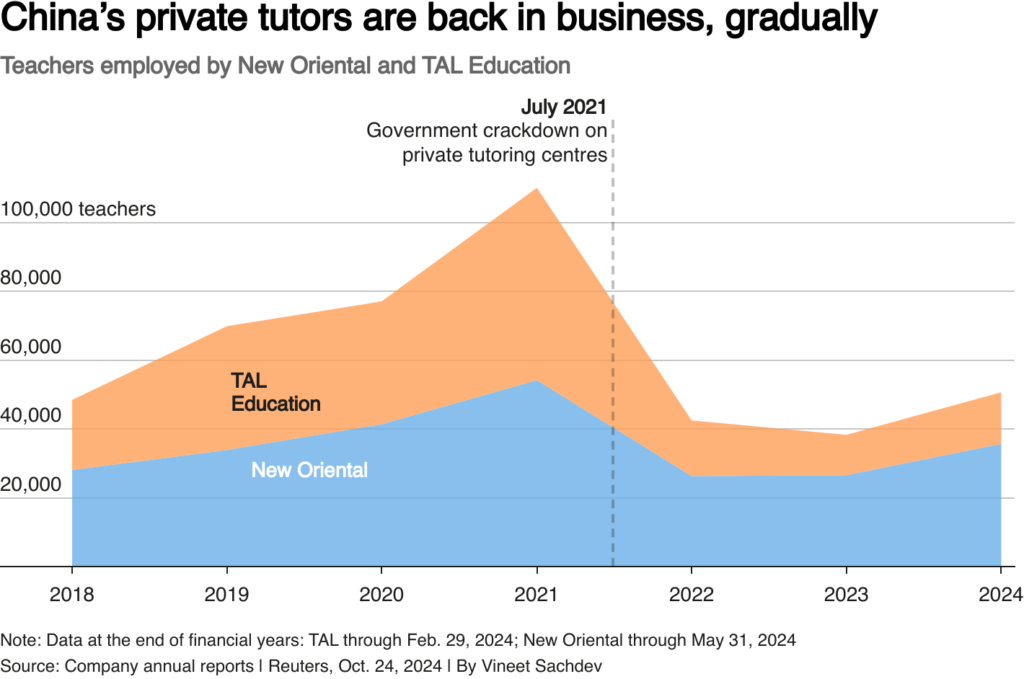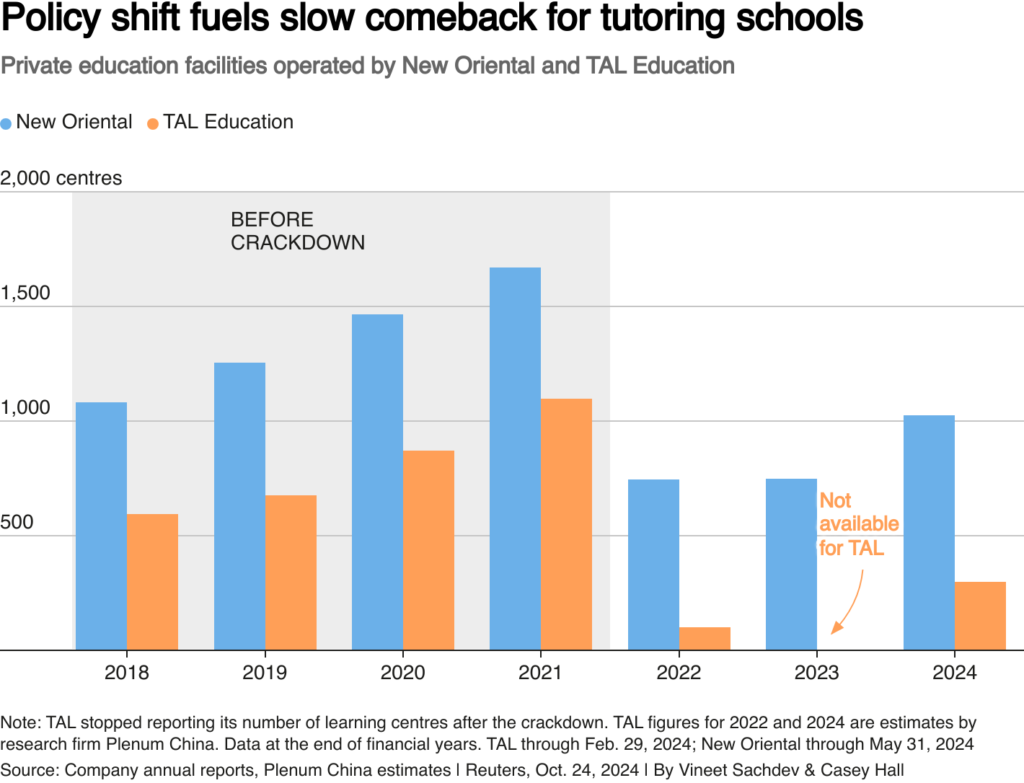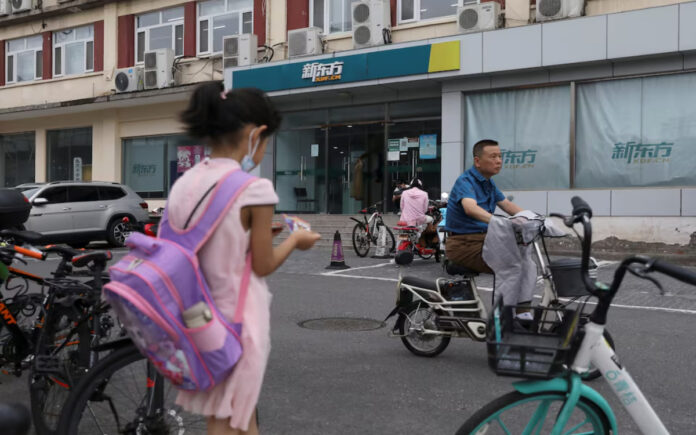Beijing: China is subtly relaxing regulatory pressure on private tutoring operators, aiming to rejuvenate a struggling economy and sparking a gradual revival in a sector severely impacted by a government crackdown three years ago, according to industry figures, analysts, and data reviewed by Reuters. While there has been no formal acknowledgment of a policy shift, there appears to be tacit consent from policymakers to permit growth in the tutoring industry, signaling a pivot by Beijing towards supporting job creation, as indicated by eight industry figures and two analysts familiar with the developments.
This shift is manifesting in new growth among tutoring businesses and the efforts of Beijing to clarify its stance, alongside interviews with five Chinese parents who noted a gradual liberalization in recent months. Details regarding the relaxation of policy enforcement and the increasing openness of tutoring organizations have not been previously reported.
Beginning in 2021, a government crackdown known as the “double reduction” policy banned for-profit tutoring in core school subjects to alleviate educational and financial pressure on parents and students. This initiative resulted in billions of dollars being wiped off the market value of providers such as New Oriental Education & Technology Group and TAL Education Group, leading to tens of thousands of job losses. Prior to the crackdown, China’s for-profit tutoring industry was valued at approximately $100 billion, with its three largest players employing over 170,000 people.
Despite the challenges, the industry has shown resilience, with parents like Michelle Lee, 36, continuing to seek tutoring services to help their children excel in China’s hyper-competitive education landscape. Lee, based in southern China, spends 3,000 yuan a month (about $420) on after-school classes for her son and daughter, which include one-on-one mathematics tutoring and online English lessons. She stated that in recent months, tutoring schools have operated more openly than they have since 2021.
“When the policy first came out, I think those tutoring organizations were a little bit scared, so they kind of hid, like they would close the curtains during class,” she remarked. “But it seems like they don’t do that anymore.”
In China’s high-pressure educational environment, parents feel compelled to rely on outside tutoring for their children to keep up, Lee noted, adding that she has “felt a huge sense of failure” while trying to support her children’s education.
The Chinese education ministry did not respond to inquiries regarding its evolving approach to the tutoring industry. At a ministry press conference in March, Liu Xiya, a delegate of China’s legislature and president of a Chongqing-based education group, mentioned that “pain points” in education policy were gradually being addressed.
Lynn Song, chief economist for Greater China at ING, suggested that China is unlikely to formally admit that the crackdown “was a little too forceful.” Instead, he predicts a “tacit easing back toward a looser regulatory stance.” He added, “The overall policy environment has shifted from restrictive to supportive as the main goal now is stabilization,” noting that the tutoring industry is set to benefit from this broader shift.
Evolving Environment
Two executives from major tutoring companies involved in regulatory issues informed Reuters that government moves to ease the crackdown have intensified in recent months. Notably, in August, the State Council, China’s cabinet, decided to include education services in a 20-point plan aimed at boosting consumption—a critical element of Beijing’s strategy to revitalize the economy. This decision positively impacted the stock prices of listed education companies, coinciding with over 11 million university graduates entering China’s employment market.
This announcement followed draft guidelines from the Chinese education ministry in February, which clarified the types of off-campus tutoring that would be permitted, and the introduction of an online “white list” of approved companies providing tutoring in non-core subjects last year. Additionally, inspections of tutoring schools by local authorities have significantly decreased from their peak early in the crackdown, one executive mentioned.

Both executives indicated that the message they have received from Chinese officials since August is that the tutoring industry will remain tightly regulated but will have a broader pathway to operate successfully and above board, provided they do not violate restrictions on teaching core academic subjects. They spoke on the condition of anonymity as they were not authorized to speak to the media.
Claudia Wang, who leads the Asia Education Practice at consultancy Oliver Wyman, noted that the government hopes to leverage the education sector to address “super high” youth unemployment after eliminating some lower-quality players. “I think that’s very, very fundamental to the shift,” Wang stated.
Also Read | Shanghai Cracks Down on Halloween: Costumes and Celebrations Restricted
Hiring trends and actions from listed education firms indicate an industry expansion this year. Active licenses for extracurricular for-profit tutoring centers increased by 11.4% between January and June, according to research firm Plenum China. Both TAL and New Oriental have been hiring thousands of positions this year, based on data from their annual reports and a Reuters review of job listings on major Chinese employment platforms. The number of schools and learning centers operated by New Oriental and TAL has also rebounded, as reported by the companies and Plenum China.
The companies’ shares have traded this year at their highest on average since 2021, although they remain significantly below pre-crackdown levels. New Oriental declined to comment to Reuters about its response to the changing regulatory landscape, while TAL did not reply to a similar request. In its September annual report, New Oriental highlighted ongoing “significant risks” stemming from how regulations and policies related to private education are interpreted and implemented. “We have been closely monitoring the evolving regulatory environment and are making efforts to seek guidance from and cooperate with the government authorities to comply,” the report stated.
Also Read | McDonald’s Excludes Beef Patties from E. Coli Outbreak Investigation
Creative Curriculum
Another factor contributing to the industry’s revival is its inherent resilience. Despite the crackdown, private tutoring operators continued to exist in various forms, often redesigning courses to comply with restrictions or marketing them using code words. For instance, courses related to mathematics are frequently marketed as “logical thinking.”
Lisa, who operates an English tutoring school in the eastern province of Zhejiang, adjusted her curriculum to align with the rules prohibiting the teaching of core subjects like mathematics and English. She, who requested her last name be withheld to avoid official retribution, stated that she laid off 60% of her staff following the crackdown. However, the school sustained classes by pivoting to teach science-related courses in English, without labeling them as English classes.

One-on-one tutoring has also thrived as parents who can afford the higher prices hire tutors for in-home sessions. This trend raises concerns for parents like Yang Zengdong, a Shanghai-based mother of two, who pointed out the difficult choice presented by the policy: either paying up to 800 yuan per class for a private tutor or dedicating hours each day to help their children keep up.
“If double reduction continues, the academic gap between rich people and everyone else will get worse,” she cautioned. “That wasn’t what the policy was meant to do but that’s the reality, so of course it needs to change.”



